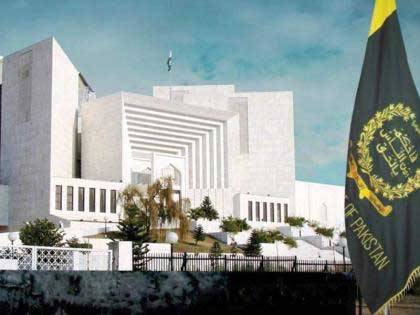ISLAMABAD - The Supreme Court of Pakistan Tuesday barred the Accountability Courts from announcing a final verdict in corruption cases.
A five-member bench of the apex court headed by Chief Justice of Pakistan Justice Qazi Faez Isa conducted hearing of the federation and an individual’s Intra-Court Appeals (ICA) against the apex court judgment, dated September 15, 2023.
The order said; “The concerned courts (Accountability) may proceed with the trial but will not announce the final judgment.”
In this regard, the bench issued notices to Pakistan Tehrik-e-Insaf (PTI) Chairman Imran Khan and Chairman National Accountability Bureau (NAB). The notices were also issued to Attorney General for Pakistan (AGP) and the Advocates General of all the provinces and Islamabad. The case is adjourned until the detailed judgment is announced by the majority of three-judge bench.
A three-judge bench, headed by ex-CJP Umer Atta Bandial on September 15 by a majority of 2:1 had declared the amendments null and void and ordered the reopening of all corruption cases worth less than Rs500 million that were previously closed against political leaders of various parties and public office holders. The court had directed the NAB to return all cases records to the relevant courts within seven days of the date of judgment.
Advocate Saad Hashmi, the associate of Makhdoom Ali Khan, who represented the federation in Imran Khan petition against the NAB amendments, argued that the Supreme Court (Practice and Procedure) Act, 2023 was enacted and Full Court of SC heard the challenges to the Act and sustained it and it has been declared in accordance with the Constitution. He stated that the Act provided mechanism for the formation of benches, which may be a procedural matter, but Section 4 of the Act says where the Constitution provisions are involved then the bench must comprise of five judges of the Court, adding the Act was given effect on 21st April 2023 and the impugned judgment passed on September 15. He also contended that the petition was filed under Article 184(3) of the constitution assailing the amendments in NAO and a three-judge bench announced the judgment on September 15. He said the matter should have been decided not less than five-member bench. Farooq H Naek informed that he also filed an appeal on behalf of a private person, who was an accused and the impugned judgment adversely affected him without impleading him as a party. As a matter of abundant caution, he also filed the review petition. He, however, did not press the appeal and sought impleadment as party and withdrew the appeal.
The Full Court announced its order on Practice and Procedure Act (PPA) on October 11, but the detailed judgment of it has not yet been delivered. AGP Mansoor Usman Awan and Farooq H Naek supported the proposition of Hashmi that this legal matter (PPA) be decided first. In view of that the bench decided to fix the appeal after the announcement of the PPA detailed judgment. Justice Mansoor Ali Shah in his judgment, announced a day ago (October 30), said that the mode of holding the elected representatives accountable for the offences of corruption and corrupt practices through criminal prosecution has not been provided by the Constitution but by the sub-constitutional laws - the PPC, the PCA and the NAB Ordinance. If Parliament can enact these laws in the exercise of its ordinary legislative power, it can surely amend them in the exercise of the same legislative power.






